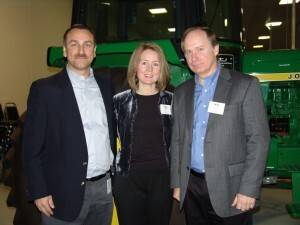Finding the STEM in Farming
Guest blog post by Sally Hollis of Lanehaven Farms
What answers do you get if you ask someone to list STEM careers? My guess is you may hear things like mechanical engineering, architecture, medicine, computer programming, or research analyst. I doubt you will hear farming very often. However, STEM is a large part of everyday farming in the 21st century!
STEM stands for Science, Technology, Engineering and Math. You don’t have to look far to find STEM in everyday farming. Here are a few examples:
- SCIENCE – Midwest farmers will soon be planting #crop15, and one area that has seen a lot of science improvements is the seed that is planted. Scientists are constantly working to improve seeds to better withstand different weather conditions (e.g. wind and drought) and overall improve yield. Farmers do a number of scientific tests throughout the year to ensure all of their management practices are optimal. These tests include things like soil samples, water quality samples, moisture testing harvested grain in the fall, feed particle size for livestock operations, and the list goes on.
- TECHNOLOGY – You can hardly open a farming magazine today without an article on new technology. Precision farming technologies are being used in much of the equipment today to auto-steer equipment and attachments with increasing precision and accuracy, vary the rate of seeds and fertilizer, and send alerts or messages to farm managers. Drones are being used for crop scouting and monitoring farm areas more efficiently. Technology has also increased for livestock operations with hardware and software to monitor everything from feed ordering to building maintenance issues. A number of farmers are also looking at installing solar panels around their operations for energy.
- ENGINEERING – Engineering is designing and building a new or improved product or process. Farmers do this on a regular basis. They may modify a tool bar to better meet their needs, design a new grain leg, or modify a sprayer to plant cover crops. Farmers are also documenting their processes and looking for ways to improve efficiency.
- MATH – Math is something that is definitely used on a daily basis. Farming is a business which requires solid financials to remain competitive in today’s environment. In addition to financial performance farmers are constantly doing mathematical calculations to determine everything from acres of coverage to bushels of grain.
The future is so exciting! Science, math and engineering are applicable to nearly every career. That’s why I believe STEM education in Iowa elementary and secondary schools is so important.
As high school graduation approaches for many, I want to remind leave them with some great advice that was given to me 25 years ago: “If you like science and math, consider a STEM career in the field of agriculture

